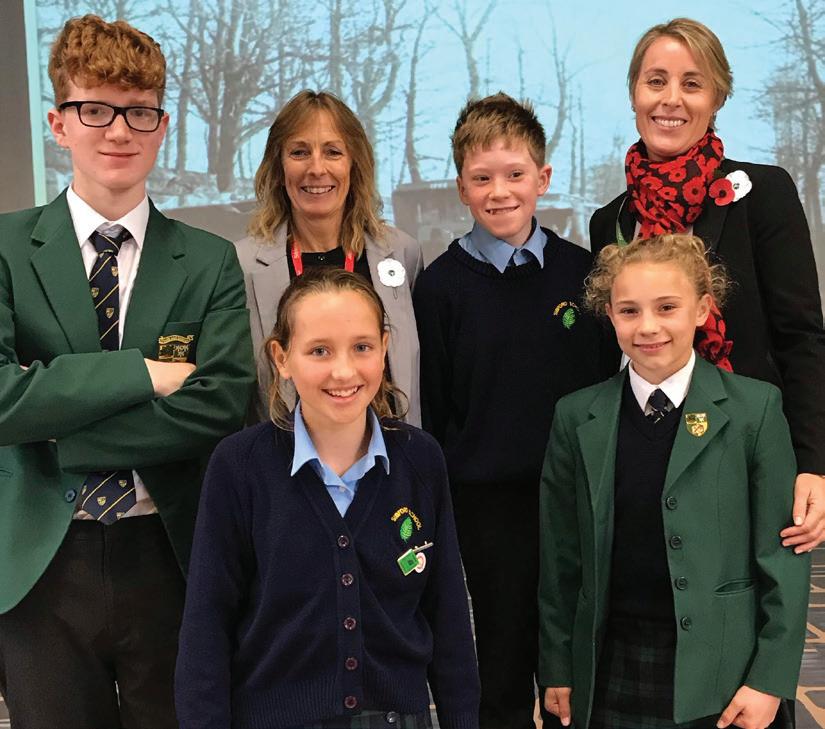
8 minute read
EBacc off music, Angela Chillingworth
EBacc off music Angela Chillingworth blows the trumpet for music in schools – and in their Heads
The UK music industry is one of the greatest contributors to the economic well-being of this country. UK Music’s Measuring Music (report September 2018) estimated that the UK music industry, which employs over 145,000 people, contributed £4.5 billion to the economy in 2017: with £2 billion coming from musicians, composers, songwriters and lyricists; £700 million from recorded music; and £505 million from music publishing. In terms of exports, the sector earned £2.6 billion overall.
UK Music chief executive Michael Dugher commented: ‘British music brings enjoyment to millions and makes a massive contribution to the UK plc. I’m really proud of the fact that these figures show once again that when it comes to music, we in the UK are very, very good at what we do. We are a global leader in music and we continue to grow faster than other parts of the British economy and to punch well above our weight. Every child from every background should have the opportunity to access music, to experience its transformative power and to try out a career in the industry if they want to – regardless of whether or not they have access to the Bank of Mum and Dad. That’s why we need further government support to help us ensure we produce the next generation of world-leading British talent by backing music in education, protecting grassroots music venues and making sure that creators are properly rewarded for their work.’
The Musicians’ Union is concerned that low-income British families are at risk of under-representation in the music industry as children are priced out of learning instruments. Their research (Musicians Union data released on 6th November 2018) shows that families from lower socio-economic backgrounds are half as likely to have a child learning an instrument as more affluent peers, despite similar levels of interest from both groups of children. Their research also details the extent to which learning a musical instrument can positively influence young people’s formative wellbeing. Almost half of parents report more confidence and better concentration in their child, and over one-third say they are happier overall, if they attend music lessons. Almost one-third note higher levels of self-discipline and patience, suggesting access to music lessons could foster higher achievement levels across all education subjects.
In October 2018, Sound and Music launched CanCompose, a national survey to gain a better understanding of how children and young people across the UK are being supported to learn how to compose and create their own music, a core element of a creative music education. For children and young people,
learning to compose is not only a highly engaging activity that enables them to develop their own musical voice, it also creates opportunities for them to express their identities through play. Composing your own music at a young age can support the development of creative thinking, confidence and teamwork abilities, and the associated higher order thinking skills which are highly valued in today’s society and workplaces and will be increasingly so the future. The creativity and potential of children and young people is currently hampered by the growing pressures on arts and music education and a lack of progression routes for young creators of music. (Sound and Music Survey launched 31st October 2018: findings to be published in March 2019)
New research into Secondary Music Curriculum Provision between 2016-18/19 by the School of Bernard Trafford – Super Head Education and Social Work at the University of Sussex has revealed that an increasing number of schools are reducing music in the curriculum for year 7, 8 and 9 students, and, in some schools, music is taught only on an ‘enrichment day’ once a year. GCSE music numbers are declining; 15.4% fewer centres are offering A Level music in 2018 compared to 2016; and there has been a reduction of 31.7% in A Level music technology.
The EBacc particularly has a negative impact on the provision and uptake of music in schools within and beyond the curriculum. Some schools discouraged top set students from taking music at KS4 because of the EBacc, whilst in others, lower ability students were prevented from taking music so that they could concentrate on core subjects. Deborah Annetts, Chief Executive of the Incorporated Society of Musicians, said: ‘This vital research by the University of Sussex makes for troubling reading and only adds to the growing body of evidence that EBacc proposals are having a negative impact on music in our schools. Schools are under pressure to focus their curriculum through the narrow lens of the EBacc and as a result, provision and uptake of music is suffering and at risk of disappearing completely from our schools. Music is central to our cultural life, a key driver of economic growth, and gives our children the tools to navigate a fast-changing digital world.’
Studies show again and again that the one aspect of the curriculum which makes the most difference to all-round student progress is music, yet this is the subject that is cut from the curriculum most often and is suffering such dwindling numbers that it may not survive in state schools. Many believe that the EBacc is directly responsible for the decline of music
Hearts, bodies and minds in schools. The list of subjects by which a school’s success is measured does not include any of the arts, and in times of stringent cuts, the subjects that are supposedly irrelevant to statistics are side-lined or removed altogether.
Some may argue that losing arts subjects does not matter, that they are for the less able students and that what really matters in a cut and thrust world is maths and science. However, university requirements for trainee doctors are increasingly seeking an arts subject as well as A levels in biology and chemistry, in order to determine whether they are able to show creativity alongside their skills in science. Research shows that music is the second hardest A level, requiring specialism in three discrete areas.
Playing an instrument increases one’s mental flexibility and enhances one’s ability to pick up new concepts, see connections and add a creative twist to an old idea, all skills that are in demand in today’s employment market.
The people in charge of our children’s education are rarely musicians. A survey shows that the most common degree taken by Head Teachers is English, but these are not necessarily the most successful Heads. Those with the highest salaries and the most OBEs and MBEs seem generally to be former PE teachers, but in some cases their success may be attributable to having taken over a struggling school or even by making sure that pupils who perform poorly at GCSE leave. After a few years, Heads of this sort move on, leaving a school that has not shown real improvement, only an increased number of higher grades. You may be surprised to learn that the most successful Heads are usually historians - or music teachers. On the whole their results are stable for the first three years but then start to show a real improvement, as these Heads are able to see the bigger picture and plan for the long-term, focusing on relationships within the community and provision for under-performing students.
At Ipswich High School, the Heads of the Senior and Prep Schools recognise the significance of music in the curriculum. Music is compulsory for students in Years 7 and 8 and the Heads have enabled the PRIMO (Prep Range of Instrumental Music Opportunities) Programme. Their investment in instrumental lessons for every pupil from Years 2 to 5 shows an absolute faith in the ability of music to improve academic results, and also that they are willing to take a long-term view regarding the mental well-being of all students. Music does not give quick results, but we are not interested in short-term gains. This is a race that will be won by the tortoises and, with parental support, we guarantee that music will enhance and enrich the lives of children throughout their time at school and into their adult lives.
Angela Chillingworth was English National Opera’s Principal Double Bass player and is Director of Music at Ipswich High School.
&THERE HERE
If you have news of topical interest, however brief, for ‘Here and There’, please email it to Tom Wheare at tom. wheare@gmail.com. Items should not exceed 150 words. Good colour photographs are also welcome.

Sibford School commemorates the 100th anniversary of the Armistice Staff and pupils at Sibford School in Oxfordshire launched a week of events to mark the 100th anniversary of the Armistice by welcoming Linda Palfreeman, author of the book ‘Friends in Flanders’, who spoke to pupils about the work undertaken by the Friends Ambulance Unit (FAU) during the First World War.
‘Most Quakers were of the opinion that any war was directly opposed to their beliefs and to the ‘law of love’. However, many of the younger men in particular were anxious to carry out work in the war zones. They wanted to share the dangers and the deprivations being suffered by their countrymen who were risking their lives at the front and they believed that one way of being able to do this was by creating an ambulance unit.’
Linda went on to outline some of the work undertaken by the FAU, particularly in Ypres where the men worked tirelessly to try to alleviate the suffering of the townsfolk and where they faced the added challenge of a typhoid epidemic.
‘In collaboration with the British Army, the FAU undertook three systematic measures to deal with the situation in and around Ypres: to identify all civilian typhoid sufferers and transport them to hospitals; to purify the water supply; and to open inoculation centres.’
The FAU’s actions were greatly appreciated by the people of Ypres as a letter subsequently published in the Quaker magazine ‘The Friend’ reveals: ‘Neither ourselves nor our poor will ever forget your generosity towards us,’ it reads. ‘We shall always keep a very happy memory of the English Ambulance … its only object had been to spread benefits around us and to distribute true comfort during these mournful days.










